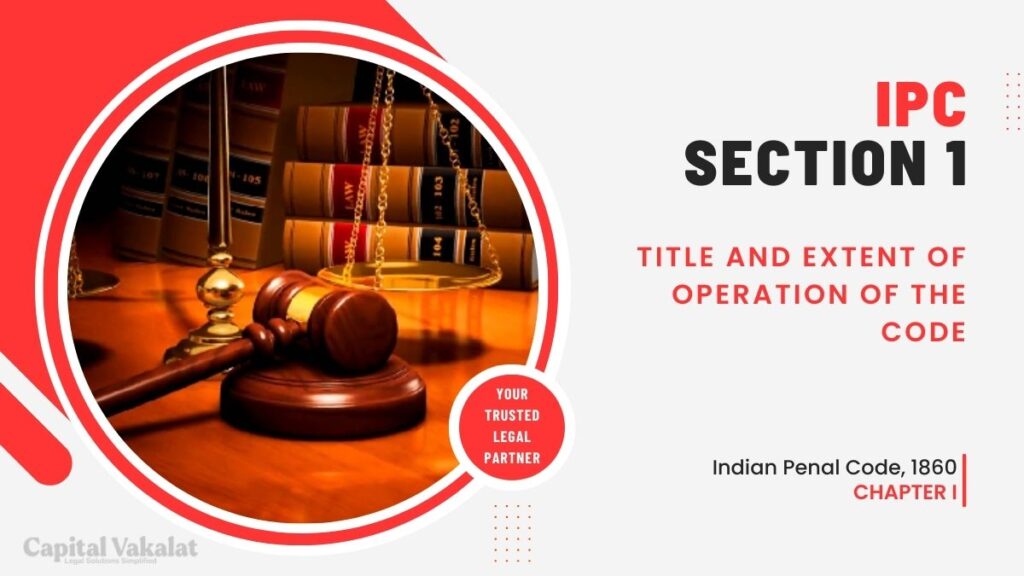In the vast realm of legal frameworks, the Indian Penal Code (IPC) stands as the bedrock of criminal law in India. As we delve into the intricate world of legal statutes, Section 1 of the IPC emerges as the gateway to comprehending the code’s essence, purpose, and scope.

Understanding Section 1 IPC
At the very foundation, Section 1 of the IPC sets the tone for the entire code. It serves as the preamble, revealing the title, extent, and territorial operation of the code. This section is often referred to as the “enacting section” since it formally introduces the IPC and outlines the fundamental principles that govern it.
Title of the Code
The title of the code, “Indian Penal Code,” encapsulates the purpose and nature of the legislation. It establishes that the code pertains to matters of criminal law, delineating the acts considered offenses and the corresponding penalties.
Extent of Operation
Section 1 further clarifies the geographical scope of the IPC’s application. It specifies that the code is applicable throughout the territory of India. This means that the provisions outlined in the code have jurisdiction over acts committed within the physical boundaries of the country, regardless of the region or state.
Territorial Jurisdiction
The IPC’s territorial jurisdiction extends not only to offenses committed within Indian territory but also to offenses committed by Indian citizens outside the country. This principle is crucial in dealing with criminal activities involving Indian nationals abroad, ensuring that justice is served regardless of the location.
Operative Date
Additionally, Section 1 designates the operative date of the Indian Penal Code. The code came into effect on 6th October 1860, marking a significant milestone in the history of India’s legal system. It brought about a unified set of principles to guide the prosecution and punishment of criminal offenses.
Significance and Implications
Section 1 IPC carries immense significance as it lays the groundwork for the entire legal framework. It defines the boundaries within which the code operates, offering a structured approach to dealing with criminal acts. By establishing its applicability across the nation, the IPC promotes consistency and uniformity in administering justice.
Conclusion
In conclusion, Section 1 IPC serves as the cornerstone of the Indian Penal Code. It outlines the title, scope, and territorial application of the code, setting the stage for the comprehensive legal structure that follows. As a society, understanding the essence of Section 1 allows us to grasp the foundational principles that guide our approach to criminal law.
Here are some external resources to learn more about “Section 1 IPC: Title and Extent of Operation of the Code”:
- Indian Penal Code – Section 1: Read the complete text of Section 1 of the Indian Penal Code on Indian Kanoon.
- Overview of the Indian Penal Code: ClearIAS provides a comprehensive overview of the Indian Penal Code, including Section 1.
- Indian Penal Code: Evolution and Significance: Legal Bites offers an insightful article on the evolution and significance of the Indian Penal Code, shedding light on its foundational aspects.
- Understanding Legal Concepts: IPC Section 1: iPleaders presents a detailed analysis of IPC Section 1, discussing its implications and importance in the legal context.
- Introduction to the Indian Penal Code: Manupatra Fast provides an introduction to the Indian Penal Code, elucidating its scope and application.
Remember to verify the credibility of the sources before relying on the information they provide.
FAQs
Can the IPC be invoked for offenses committed by Indian citizens abroad?
Absolutely, the IPC’s jurisdiction extends to offenses committed by Indian nationals outside the country as well.
When did the IPC come into effect?
The Indian Penal Code became operational on 6th October 1860.
Is Section 1 IPC amendable?
No, Section 1 primarily lays down the foundational aspects of the code and is not subject to frequent amendments.
What is the significance of Section 1 IPC?
Section 1 IPC establishes the title, extent, and territorial operation of the code, providing a clear framework for the entire legal system.